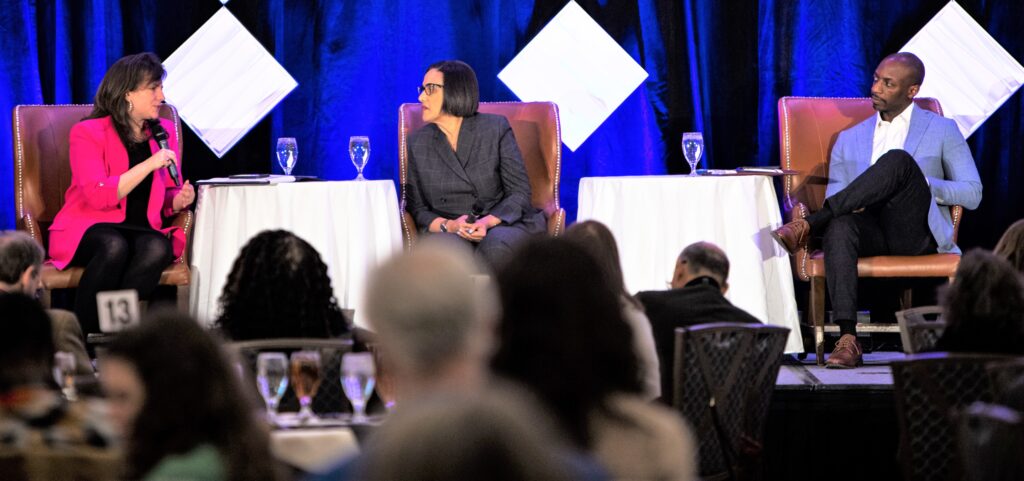
Scientific knowledge is no match for entrenched misinformation, JAMA Editor in Chief Kirsten Bibbins-Domingo, M.D., told a luncheon crowd at Health Journalism 2023 on Saturday, March 11 in St. Louis. Just look at ivermectin.
JAMA recently published the fourth big, randomized trial to find that the antiparasitic medication doesn’t improve COVID symptoms. Yet Bibbins-Domingo said she is aware that no amount of high-quality evidence will quash persistent claims that ivermectin is a COVID miracle cure. At the same time, she said, ethical questions arise when researchers continue to study what many consider to be settled science.
“When you publish a trial on ivermectin at this point in the pandemic, you are met with two reactions: ‘Why in the world would you publish a trial on ivermectin? We already know the answer to that.’ And ‘Why in the world would you publish this trial because this trial is flawed in all of these ways and doesn’t satisfy me,’” she said.
She and fellow panelist Garth Graham, M.D., global head of health care and public health at Google/YouTube, agreed that technology companies and medical journals — along with other health communicators such as journalists — must cooperate in novel ways to counter harmful falsehoods before they snowball.
They were the featured speakers at a roundtable discussion, “Malignant misinformation: The quest for a ‘cure,’” co-moderated by Kaiser Family Foundation Senior Fellow Irving Washington and Washington Post reporter Lauren Weber. The luncheon also honored recipients of the 2022 Awards for Excellence in Health Care Journalism.
Graham, a cardiologist and public health expert, touted “prebunking,” or warning people about potential disinformation before they encounter it. Once false information takes root, it is hard to dislodge, he said, citing the staying power of a 1998 Lancet article, which was later retracted, that wrongly linked autism to the measles, mumps and rubella vaccine.
“Sometimes when you’re late in the game with this information journey, this information delivery, people really do get kind of hardened” to inaccuracies, he said.
He added, “The real question is: How do we shape those conceptual narratives earlier on in the conversation?”
Graham said emerging misinformation is detectable in forums such as comments sections of articles. “You see very early on where questions and thoughts are percolating across the ecosystem,” he said. That’s when prebunking needs to start.
Baseless narratives — such as social media claims that a COVID vaccine caused Buffalo Bills safety Damar Hamlin to collapse on the field — tend to play out in predictable ways, added Bibbins-Domingo, a general internist and cardiovascular disease epidemiologist at the University of California, San Francisco. That may give online platforms and journalists an opportunity to intervene.
“You do see these patterns once you start looking at them,” she said.
Calling collaboration “the crux” of an effective response, Graham invited journalists to reach out to him in an effort to create “greater linkages that can evolve quickly around misinformation dissemination.”
For their part, researchers can do a better job of anticipating how the public will perceive their work, and journals can frame findings for broader audiences and provide “tools” to combat bad actors – including physicians – who spread lies, Bibbins-Domingo said.
However, she acknowledged that she is still working out the appropriate “voice” for her own journal, which is “critiqued in this type of debunking effort as representing the medical establishment, representing the pharmaceutical establishment.”
Despite the potential for social media to spread bunk, Graham said he’s grown to appreciate how accurate information empowers patients.
“I used to resent Dr. Google, and now I’m literally becoming Dr. Google,” he said, evoking laughs.
During the awards portion of the program, 42 news stories were recognized in 14 reporting categories including audio, beat, business, consumer/feature, health policy, investigative, public health, student and trade.




